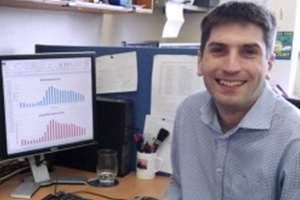Real-life story – Clinical Computing by Thomas Butterfield
Thomas started with a degree in electronics and then joined the NHS Scientist Training Programme.
- Programme
- STP
- Role
- Trainee
How I got into the role
I fully intended to go into medical device development but did one of my training placements in clinical computing and got hooked on the fast changing technology and plentiful supply of interesting challenges.
What I do
My job is all about problem solving. My colleagues and I develop computer technology to improve the way our hospital runs. That could be anything from designing interfaces to allow quicker (but still safe and secure) access to information about our patients, to sophisticated behind-the-scenes algorithms for data mining or processing images. I work with a range of staff including clinicians, nurses and various other technical and non-technical staff. The success of my projects is directly related to how well I work with the people who’ll end up using the technological solution I develop, so it’s important to have good working relationships. It is very satisfying to find an elegant technical solution to what can be very complex problems.
The best bits and challenges
The best parts of the job are always seeing the software I developed being used to improve the way we run our services and making a positive difference to our staff/patients’ lives. It is very satisfying to find an elegant technical solution to what can be very complex problems. I am also constantly learning in this job and there are always new and exciting technologies to explore.
In recent years it has been especially interesting to work with ‘big data’ technologies, and, with the era of machine learning/artificial intelligence firmly upon us, I am now working with some of these technologies which are fascinating. It can take a long time to see change implemented in an organisation as large as the NHS though, which can be frustrating at times.
Life outside work
I always have some sort of project on the go to dig my teeth into, whether that’s DIY at home or learning to play the violin. I find deliberately not having access to work email from home a good way of switching off from work.
Career plans and top tips for others
I am continuously developing my skill set by proactively learning new technologies, something that’s very important in the fast-moving world of computing. Our department has strong academic ties with the University of Sheffield and I attend various informatics-related research forums. I’m passionate about supporting clinical research. It’s only by trialling new drugs and treatments now that we’ll be able to improve healthcare for all in the future.
For a career in clinical science, you need to like a challenge and have a creative mind, be patient and good with people, and be able to multi-task too.
